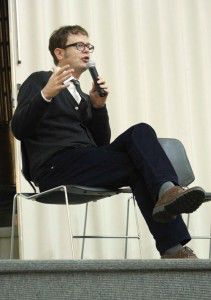
Although Rainn Wilson is known for playing comedic character Dwight on “The Office,” the actor is also an activist for human rights.
Wilson, who addressed about 450 Boston University students and faculty at Morse Auditorium on Tuesday, joined Executive Producer David Hoffman and Director Jeff Kaufman, who presented their documentary about Iran’s persecution of Bahá’í citizens called “Education Under Fire.”
“I believe education is an important part of being a human being. It’s what makes us who we are, and it’s good for our heart, minds and our souls,” Wilson said.
Wilson, who practices the Bahá’í faith, explained its history. The religion, he said, was founded in the 19th century and promotes the unity and equality of all humankind, regardless of race or gender.
The documentary, “Education Under Fire,” featured interviews with graduates from the Bahá’í Institute for Higher Education, a grassroots organization that offers college education to Bahá’ís, who were previously denied acceptance from Iranian universities.
In the half-hour documentary, BIHE graduates and human rights activists spoke about the Iranian government’s efforts to stifle the progress of Bahá’ís, including the unwarranted imprisonment of BIHE teachers and students.
The Bahá’í make up Iran’s largest minority groups with about 300,000 practicing citizens, Kaufman said. In directing the documentary, he said he aimed to galvanize conversations about the right to higher education in Iran and around the world.
“One of the most important messages of the film is that there’s a lot of support outside of the Baha’i community for the Bahá’í in Iran,” Kaufman said in an interview.
However, Kaufman said the problems facing the Bahá’í in higher education need to be addressed by more universities in the U.S.
“Many of these students who have graduated from the BIHE after working tremendously hard and have come to the United States to try to get their BIHE credits accepted by graduate schools,” he said. “But when the colleges go back to Iran to ask for legitimization, the Iranian government says the BIHE doesn’t exist. They’re stuck in this terrible catch-22.”
Northeast Regional Director of Amnesty International Joshua Rubenstein said the Bahá’í have faced unwarranted arrests, imprisonment and judicial executions, in addition to educational oppression. These measures are part of the systematic persecution the Iranian government has performed since the Revolution in 1979.
Kaufman, as well as a panel including Rubenstein, Wilson and a former BIHE student, said they encourage students to request that more Boston-area graduate schools accept credits from applicants who completed their education at BIHE.
Ruha Benjamin, assistant professor of sociology and African American studies at BU, spoke about BU’s history of human rights activism.
“The right to education is part of our development,” she said. “BU was among the first, if not the first institution in the world to officially recognize the grassroots university in Iran that’s the focus of this documentary.”
Benjamin, who helped to organize a panel following the screening of the film, said BU admitted a BIHE graduate to its master’s program in social work, despite the Iranian government’s attempts to shut down BIHE.
Benjamin was referring to Mojdeh Rohani, who completed her master’s in social work at BU. Rohani is now an adjunct professor at the School of Social Work and an associate clinical director for the Community of Legal Services and Counseling Center in Cambridge.
Speaking before the audience, Rohani said she encouraged students coming together as a college community to fight injustice.
“We need to raise awareness for ourselves and collectively as a group because we can no longer afford to live in a world where we’re just concerned about what’s important to us,” Rohani said. “It’s not good enough if we have the freedom to do what we want to do. We need to take action and make sure education is possible for everyone else.”
This is an account occasionally used by the Daily Free Press editors to post archived posts from previous iterations of the site or otherwise for special circumstance publications. See authorship info on the byline at the top of the page.



